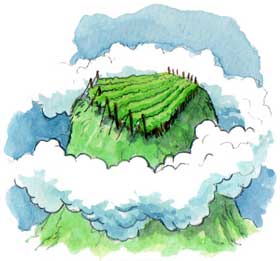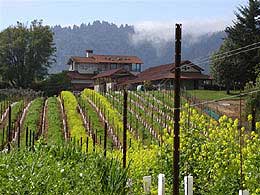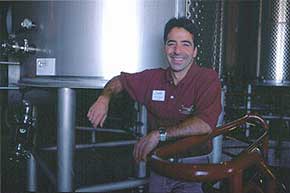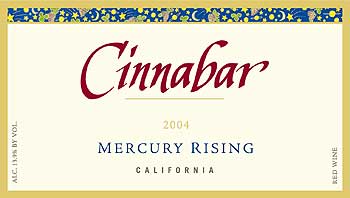

Cinnabar Winery is perched at about
1650 feet on the eastern edge of the
Santa Cruz Mountains range, where its vineyards look like little islands poking up above the Pacific Ocean fog.
Passionate About Cab
in the Santa Cruz Mountains:
George Troquato & Cinnabar Winery
Cabernet is so weather dependent, it is a real struggle to get it ripe in this climate. One year you’ll have an austere Cab, and the next, a wine which is nice, rich and dark.
~George Troquato
by
Laura Ness
February 9, 2007
It was a crisp winter afternoon when I went to visit George Troquato, the winemaker at the Cinnabar Winery. In fact, it was actually warmer in the cellar than it was outside: a rarity. Perched at about 1650 feet on the eastern edge of the Santa Cruz Mountains range, the vineyards overlook the Silicon Valley below, like little islands poking up above the Pacific Ocean fog. The operation is impressive: clean, organized and immaculate. The winery, which has been operating for over twenty years, presently makes 15,000 cases of wine. Very little of that represents wines in the SCM program. But that is changing.
The name Cinnabar comes from the ore of mercury which alchemists believed could enable ordinary metals to be turned into silver or gold. Owner Tom Mudd is a Stanford Ph. D. who was a research scientist at SRI. Smitten by the wine bug, he attempted to buy the Mount Eden Winery in 1982. When that failed, he flew over the neighboring slopes of the Saratoga hills in a helicopter,

Cabernet Vineyard in the sky at Cinnabar.
and saw what was to be Cinnabar Winery for the first time. He purchased 25 acres and planted half to Cabernet and half to Chardonnay using the Mount Eden clones of both.
In 1999, they replanted 12 acres of the estate vineyards with two acres of Pinot Noir, three acres of Chardonnay and the remainder to Cabernet Sauvignon, using certified clones and rootstock better suited to the soil and climate conditions. These vineyards feed the Estate Chardonnay program, and the appellation Pinot and Cabernet programs. Presently, George buys 80 percent of the fruit he needs, with about 20 to 30 percent of that coming from the Santa Cruz Mountains. “Historically, there has been very low availability of Santa Cruz Mountains fruit,” he explains. That, too, is changing. The bulk of the purchased fruit goes into the Mercury Rising program, the Paso Merlot program, ad the Monterey Chardonnay program.
George is intensely passionate about the Santa Cruz Mountains: he’d like to make more appellation designate wine to really give people that sense of place. He’s also passionate about Cabernet. He told me point blank, “Cabernet is far harder to make than Pinot Noir. If you have the right site, the right clones and you handle it right, you can make good Pinot,” he notes.
“Cabernet, on the other hand, is so weather dependent, it is a real struggle to get it ripe in this climate. One year you’ll have an austere Cab, and the next, a wine which is nice, rich and dark.” George knows what consumers prefer. “Nobody wants to go back to the days of 12 and 13 percent alcohol with those green flavors. I don’t like cedar and cigar box in Cab. Personally, I look for coffee, licorice and rich red and black berry fruits.”

George Troquato, Winemaker at Cinnabar Winery
“I believe there is just so much flavor per acre, and if you let the vines have their way, that flavor is diluted. I want to concentrate the flavors. I appreciate the slightly higher acidity we get here and I don’t want to lose the Santa Cruz Mountains style. I’m trying to select the best elements of the mountain fruit. If I can achieve supple tannins and a big mouthfeel; that’s what I’m after. I do not like dry tannins: they simply turn powdery with age. I want to make wines which people can enjoy when they’re released. I like to say, ‘Wine: what are you waiting for?’”
This is why he made the Mercury Rising, his most significant commercial success to date. His estate Chardonnay has been named Best of Show in the Santa Cruz Mountains Wine competition, and he’s garnered lots of honors for the Mercury Rising and Paso Robles Merlot.
You may have seen the “Mercury Rising” Cabernet blend from Cinnabar Winery on many wine lists across the country. Its approachability, coupled with complex flavors and rich texture have made it a huge hit with people looking for an everyday Cabernet with some style at a good price point. The fruit for this wine comes from vineyards in the Santa Cruz Mountains, Paso Robles and San Benito counties. Winemaker George vinifies everything separately though, and then cherry picks the best of the bunch to make his collection of Santa Cruz Mountains wines. He literally rates the barrels A, B or C, and only the As make it into the special collection of pure appellation fruit.
His Pinot Noir also sells out every year. So, what would be his highest achievement? “Cabernet is the most cerebral wine. It is the biggest challenge to my intellect. I want to make great Cabernet from these mountains.”
I asked him who he thought was setting a fine example. He immediately acknowledged Paul Draper of Ridge and Marty Mathis of Kathryn Kennedy. “That is an elegant, smooth and sleek style of Cab.”
In search of the perfect Cabernet fruit, he is buying from fairly new vineyards, including the Black Ridge Vineyards off of Bear Creek Road overlooking the Lexington Reservoir above Los Gatos. He’s also buying Cabernet Franc and Merlot from this vineyard. Down in the southern edge of the appellation, he buys from Kilmartin Vineyard in the Redwood Retreat area. We barrel sampled the 05

Mercury Rising is Cinnabar’s popular Cabernet blend.
Kilmartin and it immediately displayed enormous ollalieberry and licorice aromas and flavors with am amazingly huge mouthfeel. This was an A barrel in every way. Delicious. We also sampled a barrel of the 06 Kilmartin Cab, and the aromas were intense coffee: just like walking into a Peets Coffee store. Picked at 25 brix, this wine was already on its way to being a big mug of Cab.
The problem is, unlike coffee, you don’t get free refills when it comes to Cabernet in these mountains. With the ruthless fruit-cutting he must perform to achieve ripeness, Cabernet turns out to be one of the lowest-yielding varietals. “Cabernet is the worst in terms of yields here. Don’t talk to me about low yields on Pinot!” George laughs. And he knows what he’s talking about.
Fans of Cinnabar will be pleased to know that the winery will finally be opening a tasting room which is accessible and open to the public in downtown Saratoga, beginning in April. The
The name Cinnabar comes from the ore of mercury which alchemists believed could enable ordinary metals to be turned into silver or gold. Owner Tom Mudd is a Stanford Ph. D. who was a research scientist at SRI. Smitten by the wine bug, he attempted to buy the Mount Eden Winery in 1982. When that failed, he flew over the neighboring slopes of the Saratoga hills in a helicopter,

Cabernet Vineyard in the sky at Cinnabar.
In 1999, they replanted 12 acres of the estate vineyards with two acres of Pinot Noir, three acres of Chardonnay and the remainder to Cabernet Sauvignon, using certified clones and rootstock better suited to the soil and climate conditions. These vineyards feed the Estate Chardonnay program, and the appellation Pinot and Cabernet programs. Presently, George buys 80 percent of the fruit he needs, with about 20 to 30 percent of that coming from the Santa Cruz Mountains. “Historically, there has been very low availability of Santa Cruz Mountains fruit,” he explains. That, too, is changing. The bulk of the purchased fruit goes into the Mercury Rising program, the Paso Merlot program, ad the Monterey Chardonnay program.
George is intensely passionate about the Santa Cruz Mountains: he’d like to make more appellation designate wine to really give people that sense of place. He’s also passionate about Cabernet. He told me point blank, “Cabernet is far harder to make than Pinot Noir. If you have the right site, the right clones and you handle it right, you can make good Pinot,” he notes.
“Cabernet, on the other hand, is so weather dependent, it is a real struggle to get it ripe in this climate. One year you’ll have an austere Cab, and the next, a wine which is nice, rich and dark.” George knows what consumers prefer. “Nobody wants to go back to the days of 12 and 13 percent alcohol with those green flavors. I don’t like cedar and cigar box in Cab. Personally, I look for coffee, licorice and rich red and black berry fruits.”
How do you get it the way you like it?
Simple. Well not simple, it took years to get this right, but Troquato now buys by the acre and not the ton. And those acres are meticulously trimmed back to the exact tonnage that he thinks will fully ripen, and he will keep cutting fruit until what’s left is sure to be good. And if it isn’t just so, George simply won’t make a Cab for that vintage. This happened in 1998 and 2000.
George Troquato, Winemaker at Cinnabar Winery
This is why he made the Mercury Rising, his most significant commercial success to date. His estate Chardonnay has been named Best of Show in the Santa Cruz Mountains Wine competition, and he’s garnered lots of honors for the Mercury Rising and Paso Robles Merlot.
You may have seen the “Mercury Rising” Cabernet blend from Cinnabar Winery on many wine lists across the country. Its approachability, coupled with complex flavors and rich texture have made it a huge hit with people looking for an everyday Cabernet with some style at a good price point. The fruit for this wine comes from vineyards in the Santa Cruz Mountains, Paso Robles and San Benito counties. Winemaker George vinifies everything separately though, and then cherry picks the best of the bunch to make his collection of Santa Cruz Mountains wines. He literally rates the barrels A, B or C, and only the As make it into the special collection of pure appellation fruit.
His Pinot Noir also sells out every year. So, what would be his highest achievement? “Cabernet is the most cerebral wine. It is the biggest challenge to my intellect. I want to make great Cabernet from these mountains.”
I asked him who he thought was setting a fine example. He immediately acknowledged Paul Draper of Ridge and Marty Mathis of Kathryn Kennedy. “That is an elegant, smooth and sleek style of Cab.”
In search of the perfect Cabernet fruit, he is buying from fairly new vineyards, including the Black Ridge Vineyards off of Bear Creek Road overlooking the Lexington Reservoir above Los Gatos. He’s also buying Cabernet Franc and Merlot from this vineyard. Down in the southern edge of the appellation, he buys from Kilmartin Vineyard in the Redwood Retreat area. We barrel sampled the 05

Mercury Rising is Cinnabar’s popular Cabernet blend.
The problem is, unlike coffee, you don’t get free refills when it comes to Cabernet in these mountains. With the ruthless fruit-cutting he must perform to achieve ripeness, Cabernet turns out to be one of the lowest-yielding varietals. “Cabernet is the worst in terms of yields here. Don’t talk to me about low yields on Pinot!” George laughs. And he knows what he’s talking about.
Fans of Cinnabar will be pleased to know that the winery will finally be opening a tasting room which is accessible and open to the public in downtown Saratoga, beginning in April. The














